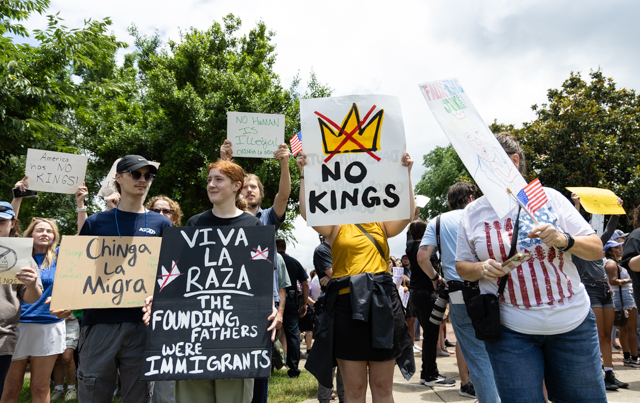‘Jefferson Lies’ an engaging read
Published 1:00 am Sunday, March 6, 2016

- sunreader_book_tom
“The Jefferson Lies: Exposing the Myths You’ve Always Believed About Thomas Jefferson” by David Barton. Washington, D.C: WND Books, 2016. 267 pp. $18.95 (paperback).
Thomas Jefferson did not father Sally Hemings’ children, he was not an atheist and he was not a key proponent of the separation of church and state. These are but three of the arguments that David Barton makes in “The Jefferson Lies: Exposing the Myths You Always Believed about Thomas Jefferson.”
Rather than a philandering anti-religious elitist, Barton attempts to restore Jefferson’s image as one of the great founding fathers and does so by arguing that he was a Christian whose political decisions were guided by Christ’s teachings. Barton argues that Jefferson was one of many founding fathers whose devotion to the tenets of Christianity has been obscured by liberal historians who use “historical negativism,” or demeaning portrayals of American heroes and values, and “historical relativism,” which holds that there are no universal truths, to malign Jefferson. Other charges include opposition to American exceptionalism and that contemporary historians use presentism, a cardinal offense in historical scholarship, to assault Jefferson, the founders and the critical role that Christianity played in the founding of the United States.
Originally pulled from bookshelves because of the controversy it engendered, “The Jefferson Lies” joins Barton’s other works, which include “Setting the Record Straight: American History In Black and White” and “Original Intent: The Courts, the Constitution, and Religion,” in affirming conservative political values and the centrality of Christianity to the founding generation.
The author is unapologetic in his denunciation of “leftist” historians’ mission to obfuscate Jefferson’s character and in his effort to use Jefferson as a vehicle to promote his view that Christianity should be at the center of modern political discourse. Despite his inherent bias, Barton largely succeeds in restoring Jefferson’s credibility as a scion of American democracy.
In the first chapter, Barton hones in on the widely held belief that Jefferson fathered Hemings’ children. Tracing this to an article appearing in Nature by Eugene A. Foster, Barton asserts that the myth of Jefferson’s promiscuity was designed to lend support to then-President Bill Clinton, who was dealing with the Lewinsky sex scandal at the time Foster’s article was published. While this statement is never clearly proven, Barton does rely on reputable sources like David N. Mayer’s “The Thomas Jefferson and Sally Hemings Myth and the Politicization of American History” and Foster’s subsequent Jan. 7, 1999, Nature article retracting his previous article’s assertion. Despite targeting the Jefferson-Hemings story as myth, Barton also incorporates sources that perpetuate the myth, like Annette Gordon-Reed’s “Thomas Jefferson and Sally Hemings: An American Controversy” and Donna Britt’s “A Slaveholder’s Hypocrisy Was Inevitable,” in an effort to demonstrate just how pervasive the lie has become among historians.
The notion that Jefferson intended Virginia University to be a secular institution is also challenged by Barton, who asserts that Jefferson intended it to be a multi-denominational institution where religious instruction and devotion were encouraged. To prove this, Barton looks to Jefferson’s memoirs and biographies of Jefferson’s contemporaries (Gaillard Hunt’s “The Life of James Madison”) to demonstrate the centrality of religious devotion to Jefferson’s early life and in that of Virginia’s other founding fathers.
That Jefferson hired ministers from various denominations to teach at Virginia University is cited as further proof that he sought religious freedom, not secularism, for his proposed university. Similarly, Barton tackles the belief that Jefferson created his own bible by referring to his own words on the subject. Rather than a rejection of certain tracts, Barton argues that Jefferson did in fact create two bibles, but that they were evidence of Jefferson’s faith, rather than his skepticism. Both bibles were created using text from the Gospels, but one was intended for Native American conversion, while the other was for Jefferson’s private use. From Jefferson’s memoirs Barton conclusively demonstrates that the second bible, which featured the Gospels in multiple languages, was meant to further Jefferson’s interest in linguistics and personal understanding of the moral teachings of Jesus. Together the chapters dealing with Virginia University and the “Jefferson Bible” form the most crucial components of Barton’s refutation of revisionist historiography.
Despite the triumphs mentioned above, Barton falls victim to the tools used by supposed leftist historians. In proving that Jefferson was a devout Christian, Barton looks at several of his late-in-life belief changes and concludes that they were heretical by 19th century and modern standards. In his discussion of whether Jefferson was an atheist, Barton concedes that in his later years Jefferson no longer believed in the holy trinity and that he discounted the validity of the epistles, instead solely favoring the Gospels of Jesus.
While answering this fact, Barton argues that primitivists’ ministers of the Second Great Awakening in Virginia influenced Jefferson to adopt “heretical” beliefs out of step with the key tenets of Christianity. While this does not disprove that Jefferson believed in God, it does weaken Barton’s overall thesis that Jefferson was a devout Christian. Equally important, Jefferson’s opposition to the holy trinity and the epistles helps undermine an almost unstated argument made throughout Barton’s work: that the Christian faith should be at the center of modern political discourse. If Jefferson, whom Barton rightly concludes is a hero of the founding generation, changed his religious ideology, and if it was indeed heretical, what denomination of Christianity does Barton believe should guide political decision-making? Barton does not make a clear statement on this and does nothing to address the doctrinal differences between the various Protestant denominations as well as Catholicism, and how favoring one ideology over another would represent a violation of the First Amendment.
Despite the flaws inherent in his own biases, Barton’s “The Jefferson Lies” is an exceptionally engaging read for readers that are either devout Christians or proponents of separation of church and state. “The Jefferson Lies” will force the reader to confront their own prejudicial beliefs about Jefferson and serve as the launching point for interesting discussions on the nature of religion and its place in contemporary political discourse.
Regardless of your political or religious persuasion, and what you believe about Jefferson, this book will offer crucial insight into the movement to bring Christianity to the forefront of politics. Additionally, by utilizing a revisionist approach to the founding generation, Barton allows the reader to question the centrality of religion to the founding generation, and whether that should determine the course of modern political discourse. For these reasons I highly recommend “The Jefferson Lies” and hope that you will gain a greater understanding of one of our most divisive founding fathers and the role of the founding generation in promoting religion in the early American republic.
— Reviewed by Thomas L. Burden, graduate student, Western Kentucky University History Department.






